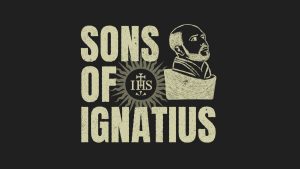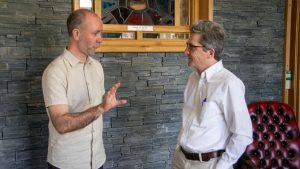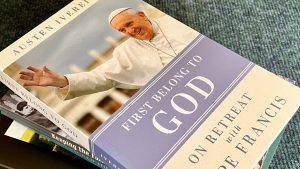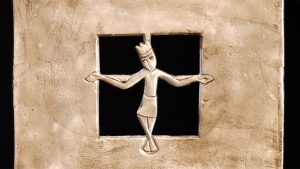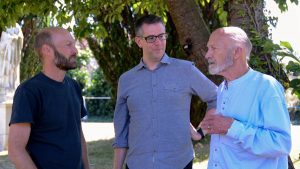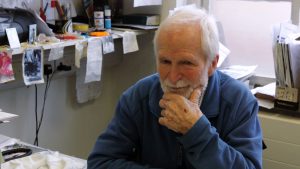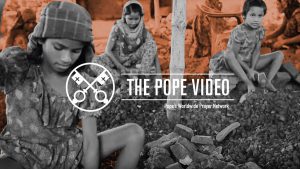Ireland and the Jews
 “God has kept true to both Christians and Jews, and is steadily throwing light on our similarities.” So writes Tom Casey SJ in one of his contributions to The Bridge, a bilingual newsletter (‘Il Ponte’ in Italian) of the Cardinal Bea Centre for Judaic Studies in Rome. Tom is the new director of the Bea Centre, bringing much related academic experience. In his opening piece, ‘Desiring the Impossible’, he remarks on James Joyce’s magnificent creation, the Jewish Dubliner Leopold Bloom. “Joyce was always struck by the similarities between the Irish and Jewish experiences,” he writes; “both nations suffered oppression and exile; the Irish and Jewish people are scattered around the world.” Read the full text below or view it in the newsletter on the Gregorian University website.
“God has kept true to both Christians and Jews, and is steadily throwing light on our similarities.” So writes Tom Casey SJ in one of his contributions to The Bridge, a bilingual newsletter (‘Il Ponte’ in Italian) of the Cardinal Bea Centre for Judaic Studies in Rome. Tom is the new director of the Bea Centre, bringing much related academic experience. In his opening piece, ‘Desiring the Impossible’, he remarks on James Joyce’s magnificent creation, the Jewish Dubliner Leopold Bloom. “Joyce was always struck by the similarities between the Irish and Jewish experiences,” he writes; “both nations suffered oppression and exile; the Irish and Jewish people are scattered around the world.” Read the full text below or view it in the newsletter on the Gregorian University website.
A new chapter for the Bea Centre – Desiring the impossible
Thomas G. Casey, S.J.
I come from a country where the most famous Jewish person of all never actually existed: the Dubliner Leopold Bloom, the protagonist of James Joyce’s Ulysses. I was born and raised in Dublin, the city of James Joyce and Leopold Bloom. When I began to teach at Joyce’s school, Belvedere College, a close Jewish friend invited me to dream big dreams: «You are forming future James Joyces», he said. Joyce was always struck by the similarities between the Irish and Jewish experiences: both nations suffered oppression and exile; the Irish and Jewish people are scattered around the world. Joyce identified with Jews, especially because of the many Jewish friends he acquired when he settled in Trieste, Italy in 1904 for 16 years. I am an insider-outsider in Italy, since Italian culture is not my natural milieu. My PhD was on the thought of Emmanuel Lévinas, and in my study of contemporary Jewish thinkers – for instance, Martin Buber, Lévinas and George Steiner – I have repeatedly been struck at how they see themselves as outsiders as well as insiders, above all through witnessing to something beyond the here and now.
Although we must be vigilant regarding the future of Catholic-Jewish relations, we are also grateful for what has been achieved, thanks to declarations like Nostra Aetate from 1965 and the commitment of many fine individuals and groups to the task of dialogue. It seems all the more extraordinary that for so many centuries we did not accentuate the huge amount we have in common. Ironically because Christianity is so rooted in Judaism, it has tended to highlight its independence by focusing on the differences.
Yet God has kept true to both Christians and Jews, and is steadily throwing light on our similarities. We both have a remarkably similar way of understanding the most fundamental and important questions. We each believe the world is created by the one God, who is infinitely beyond anything we can think and imagine, and who guides history with wisdom and compassion. Moreover we share the belief that God’s presence is manifest in history and in the human beings of our planet. We recognize that every human being is made in God’s image and likeness, and so worthy of extraordinary respect. We both strive for a better world, where God’s values will be at home. Together we believe we have a duty to exercise stewardship and care over the world, summarized in the following principle by the Jewish philosopher Hans Jonas: «Act so that the effects of your action are compatible with the permanence of genuine human life». We agree that human life is sacred, that the family is a fundamental unit of society, that the weak and defenceless should be protected. Without minimizing our theological and cultural differences, it is evident that what unites us is much bigger than anything that divides us. The great Hebrew prophets provide a blueprint we can all share, by encouraging us to practise what we preach, to wrestle with the deepest questions of life, and to answer these questions with minds and hearts full of humility, love and truth. But the deepest source of unity between us is that we share the same divine Father.
I am aware of the modest role the Cardinal Bea Centre plays in the overall scheme of things. Over the centuries many exemplary Jews and Christians have invited us to expand our horizons to the measure of the universe itself by hoping great hopes and dreaming big dreams. In our centre I would like to expand and deepen our involvement in dialogue, and continually raise standards in order to foster greater mutual respect between Christians and Jews. We may not be the biggest enterprise in interreligious dialogue, yet as the Jewish religious thinker Martin Buber declared, we must nevertheless “desire the impossible”. Instead of being content with gradual change, we must seek true transformation. «And whoever can no longer desire the impossible will be able to achieve nothing more than the all too possible».


